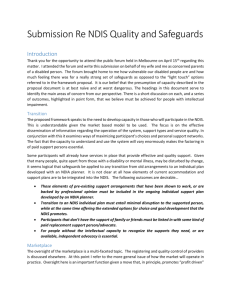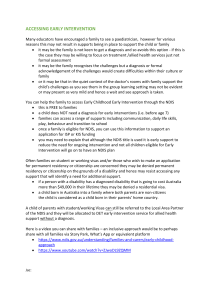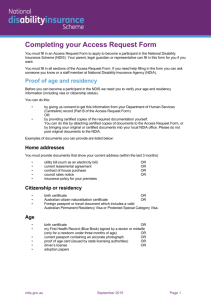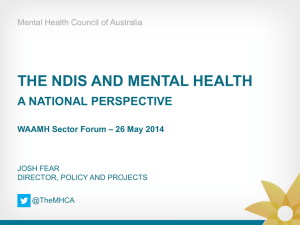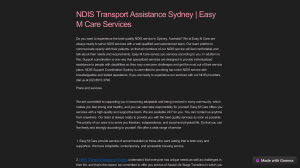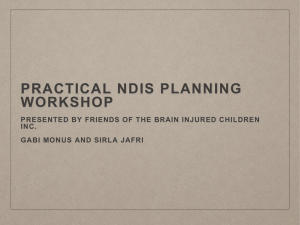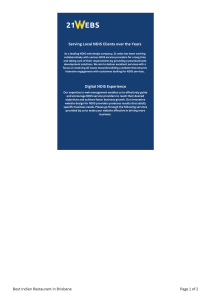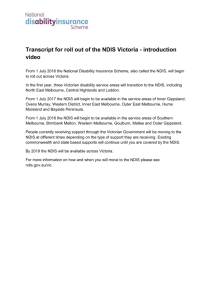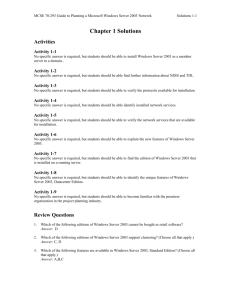Submission-to-the-Quality-and-Safeguarding-Framework
advertisement
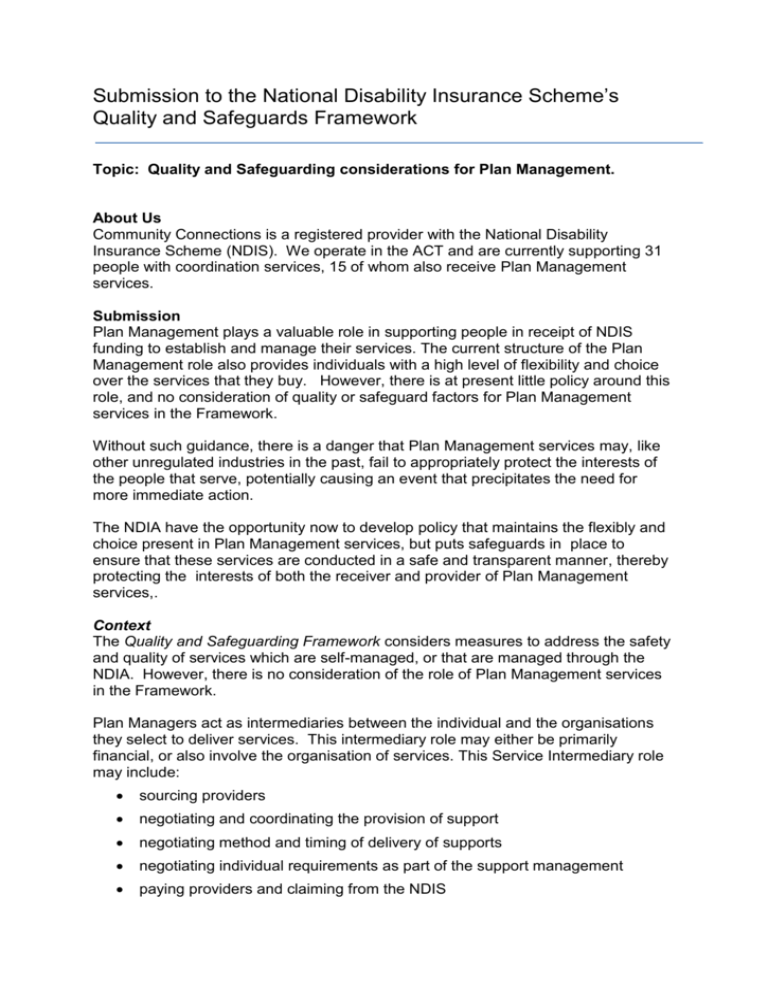
Submission to the National Disability Insurance Scheme’s Quality and Safeguards Framework Topic: Quality and Safeguarding considerations for Plan Management. About Us Community Connections is a registered provider with the National Disability Insurance Scheme (NDIS). We operate in the ACT and are currently supporting 31 people with coordination services, 15 of whom also receive Plan Management services. Submission Plan Management plays a valuable role in supporting people in receipt of NDIS funding to establish and manage their services. The current structure of the Plan Management role also provides individuals with a high level of flexibility and choice over the services that they buy. However, there is at present little policy around this role, and no consideration of quality or safeguard factors for Plan Management services in the Framework. Without such guidance, there is a danger that Plan Management services may, like other unregulated industries in the past, fail to appropriately protect the interests of the people that serve, potentially causing an event that precipitates the need for more immediate action. The NDIA have the opportunity now to develop policy that maintains the flexibly and choice present in Plan Management services, but puts safeguards in place to ensure that these services are conducted in a safe and transparent manner, thereby protecting the interests of both the receiver and provider of Plan Management services,. Context The Quality and Safeguarding Framework considers measures to address the safety and quality of services which are self-managed, or that are managed through the NDIA. However, there is no consideration of the role of Plan Management services in the Framework. Plan Managers act as intermediaries between the individual and the organisations they select to deliver services. This intermediary role may either be primarily financial, or also involve the organisation of services. This Service Intermediary role may include: sourcing providers negotiating and coordinating the provision of support negotiating method and timing of delivery of supports negotiating individual requirements as part of the support management paying providers and claiming from the NDIS assisting participants develop skills in this area This intermediary role has the capacity to be significantly influential in the financial and service decisions made by and on behalf of individual. The reasons for this include: Plan Managers develop a depth of knowledge about the types and strengths of services available in their community. People seeking Plan Management services commonly seek advice from their Plan Manager in determining which services to use. People seeking Plan Management services vary in their experience and knowledge about service management, and indeed in their interest in such matters. Some people will provide strong guidance about the type and nature of the services that they want, others select Plan Management because they wish to minimise such bureaucratic processes in implementing their plan. It is important then, that there should be clear policy about the scope and nature of the Plan Management role in order to protect people supported by services, and to provide guidance to the Plan Managers about the expectations of this role. Recommendations It is recommended that the NDIA develops policy that clearly articulates the following elements essential to Plan Management services: An Ethical Framework A clear ethics framework be developed to guide the role of the Plan Manager. It is suggested that at minimum this include requirements that the Plan Manager: Seeks, and gives effect to their client’s wishes when purchasing services. Acts in the best interest of their clients when giving advice or purchasing services. Minimises conflict of interest (including direct and indirect advantage to the Plan Manager). Minimum Safeguards When Purchasing Services. Plan Managers are able to purchase goods and services from a range of providers, including from providers who are not registered with the NDIS. However at present there are no requirements for the Plan Manager to assess or promote the quality or safety of services purchased, or to validate that these services have been received. It is recommended that Plan Managers should at minimum: Conduct due diligence checks on the provider to ensure that the entities they purchase from are legitimate and sound. Confirm that the provider has sufficient insurance, and conducts police (or WWVP) checks on their staff. Check that any equipment purchased meets Australian standards, and (particularly with hoists, chairs, etc) is recommended by an appropriately qualified professional to be safe and effective for their client. Inform the provider of any specific support needs of their client, and confirm that the provider has sufficient resources to meet those needs (for example: staff trained in PEG feeding or bowel care, hoists, accessible vehicles etc.) Establish process to validate invoices for services received (to ensure that the services claimed are correct and appropriate). It would also be recommended that a clear position be developed as to whether such checks might be waived if the services purchased are from agencies endorsed by the NDIS (ie registered as providers NDIS). A Defined Liaison and Monitoring Role The Support Clusters Definitions and Pricing document defines Service Intermediary Activities as: Undertaking regular liaison with providers and monitoring support provision. Plan Management clearly has an important role to play in safeguarding and quality of the services purchased. It would be beneficial for Plan Managers to have some clear guidance about the expectations the NDIS when conducting these activities: With liaison role: To understand the expectations of Plan Managers in mediating issues of concern between the client and provider, and working to resolve complaints and disputes. Plan Managers as the “middleman” between these two parties can play a useful mediation role in such circumstances, but this role can also take considerable time and can duplicate services available in the community. With the monitoring role: To understand what (if any) expectations there are of Plan Managers in monitoring the quality and safety of services purchased beyond the specific monitoring roles requested by the person. For example: should the Plan Manager take responsibility for confirming the safety of individuals by conducting site visits, review records, or conduct audits of the services that they purchase? If so to what extent? If not, how else will such services be assessed? It is recommended that policy be developed to more clearly articulate the NDIA’s expectations of Plan Management services in these two areas. 27 April 2015 Contact: Ian Ross Executive Director Community Connections ian@comcons.org.au 02 62961133
